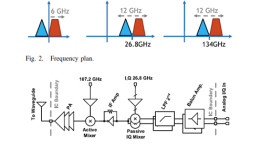Assistant Professor, Ja-beom Koo, Co-Published in the IEEE Solid-State Circuits Letters
POSTED ON: December 7, 2021

Image of diagrams from the research paper.
Assistant professor of electrical engineering, Ja-beom Koo, has co-authored in the Institute of Electrical and Electronics Engineers (IEEE) Solid-State Circuits Letters (Vol. 4, Oct. 2021 Issue) with collaborators from IEEE. The publication is on, “A 50-Gb/s 134-GHz 16-QAM 3-m Dielectric Waveguide Transceiver System Implemented in 22-nm FinFET CMOS.”
You can read more about the research here.
ABSTRACT
This letter presents a 134-GHz superheterodyne transceiver system in 22-nm CMOS for dielectric waveguides measured at reaches up to 3m. Greater than 12 GHz of RF bandwidth and 16QAM signaling combine to achieve 50Gb/s with a measured EVM of −19.8dB (∼5×10−6 BER) at a total power consumption of 494mW from a 1.0-V supply. External 2×2 matrix equalization is employed to equalize channel impairments. The system achieves an FoM of 3.3 pJ/bit/m with the highest reported data rate for waveguide links at a distance greater than 1 m to date. Key transceiver circuit building blocks are described, including RF signal paths, wideband baseband amplifiers, and filters, an IF amplifier with 44% fractional bandwidth and a coil-less 53.6-GHz quadrature divider.




